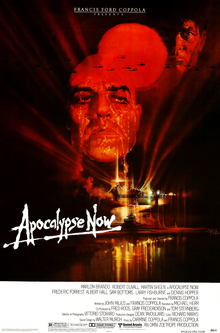
The majority of teenagers in the United States read Joseph Conrad’s Heart of Darkness at some point during high school, but surprisingly the book’s 1979 film adaptation, Apocalypse Now, is overlooked in English classes. The film follows Captain Willard as he is sent to assassinate a rogue colonel during the Vietnam War. Like the novel, Apocalypse Now is not something to be casually experienced—at least not the first time. The movie replaces Conrad’s dense narration with slow moving shots that helps create an atmosphere which progressively starts to feel more dreamlike as the movie goes on. I only say this because the setting and tone of Apocalypse Now says just as much about the narrative as any line of dialogue in the film, which is something most English majors are likely to enjoy.
Apocalypse Now uses the plot of a man traveling up a river on a boat as a symbol for someone traveling down the rabbit hole of their psyche, gradually revealing itself to be a story about obsession. Throughout his journey Willard attempts to empathize with a man who has started a cult and decided to act as a god, which only causes him to lose sense of himself. Director Francis Ford Coppola updated the setting from the Congo in the 1800s to the Vietnam War to allow for criticism of the American government and their handling of the war, but both works have a lot to say about racism and imperialist-like policies created by white men forced upon people of color. A viewing of Apocalypse Now not only will help someone draw parallels between America’s treatment of the Vietnamese and Britain’s manipulation of Africa, but also make Conrad’s novel much more accessible.
Apocalypse Now wastes no scenes. Everything in it is an example of how to show, not tell, which can help someone learn about storytelling. It’s rich with content to analyze, and every rewatch will reveal something you didn’t realize in your last viewing. Movies that give you a reason to revisit them are the ones that become classics, and Apocalypse Now will continue to be praised and studied for years to come.
